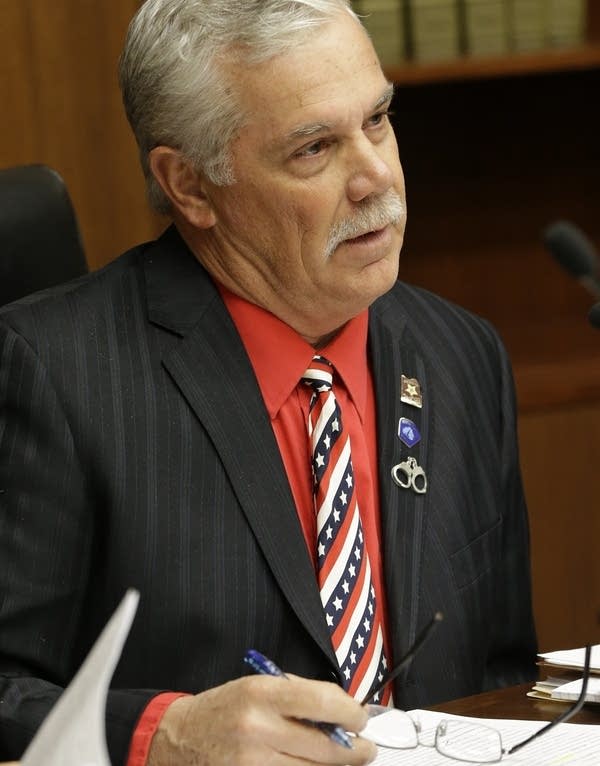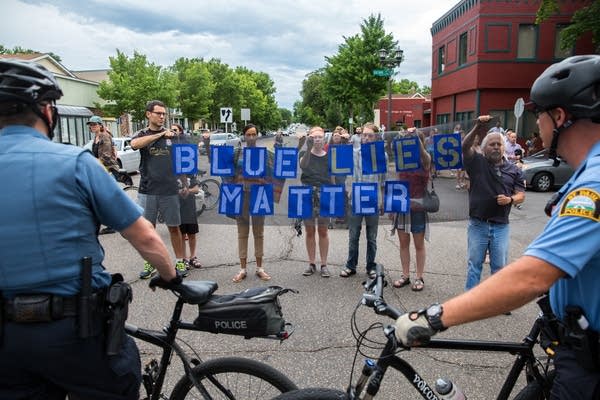Dayton draws scorn, praise for Castile shooting comments

Go Deeper.
Create an account or log in to save stories.
Like this?
Thanks for liking this story! We have added it to a list of your favorite stories.
Gov. Mark Dayton didn't pull any punches Thursday when he said he believed Philando Castile would not have been shot by police at a Falcon Heights traffic stop if he'd been white.
A day later, Dayton wasn't backing down, despite pushback from some critics, including people in law enforcement, who believed he crossed a line and possibly compromised the investigation.
"I stand by what I said yesterday, based on the information I had," he told reporters. "I don't have any new information today."
Dayton said he's heard from some law enforcement groups critical of his stance, although he didn't name names. Later in the day Friday, though, the Minnesota Police and Peace Officers Association posted a stinging rebuke of Dayton's comments.
Turn Up Your Support
MPR News helps you turn down the noise and build shared understanding. Turn up your support for this public resource and keep trusted journalism accessible to all.

Dennis Flaherty, the group's executive director, said Dayton's belief that "the tragic incident in Falcon Heights was motivated by race is the height of political malfeasance that could lead to a miscarriage of justice, if not more violence. Invoking racism without foundation of fact is incendiary."
The governor, he added, "appears to be taking justice into his own hands."
Dayton's also won support for his comments, and those conflicting reactions make it unclear whether any legislative remedies, including his proposal for a state task force on policing, will move forward next year.
One key player in those potential discussions was incensed at Dayton's thoughts on the Castile case. State Rep. Tony Cornish, R-Vernon Center, called Dayton's comments "idiotic" on Facebook.
"I was upset. I wasn't going to make any comment. I had told my leadership that I was not going to comment until all the facts were in. But I think this kind of changed the game here," Cornish, a former law enforcement officer who chairs the House Public Safety and Crime Prevention Committee, explained.

Cornish said he's concerned the governor's remarks will impact the shooting investigation, which is being conducted by the Minnesota Bureau of Criminal Apprehension. He said Dayton's injection of racism is prejudicing the inquiry.
"He had time to think about what he was going to say, and he said it anyway," Cornish said. "I don't know how else to term it. Where could that have come from? I just feel he was trying to please the advocacy groups that were knocking on his door."
Dayton rejected Cornish's theory. He said his statement won't have any impact on the BCA.
"I don't think my comments are going to be influential or should be influential on how they conduct the investigation or what their conclusions are," he said.
Dayton's remarks also surprised some lawmakers in a positive way.
Sen. Jeff Hayden, DFL-Minneapolis, said racism is an issue typically raised by social justice activists, not governors. Hayden, who is one of only three African-Americans currently serving in the Minnesota Legislature, said he was pleased to hear the governor make the statement.

"I praise him for raising the issue for people to have to wrestle with it, and frankly I agree with the governor," he said. "I think that most people of color, certainly most African-Americans, intuitively felt like the governor was right."
The Castile case has raised many questions about Minnesota's handgun laws, and how police and permitted gun owners should handle traffic stops. The Minnesota Gun Owners Caucus is suggesting a "hard look" at police training and protocols for such interactions.
Dayton said he plans to meet with NAACP leaders, black clergy and law enforcement officials to discuss next steps. He said he wants to review the findings of a presidential task force on community policing and would consider launching a similar study here.
Sen. Scott Dibble, DFL-Minneapolis, said he supports that proposal. Dibble introduced several bills last session based on the task force recommendations. Dibble said his legislation would help improve the relationships between the police and communities that too often feel mistreated.
"Failure of the police to support these kinds of initiatives and reforms works directly against their own goals of promoting greater public safety," he said. "So, I really welcome a change in culture and a change in attitude and a much, much more positive reaching out back and forth across this divide."


